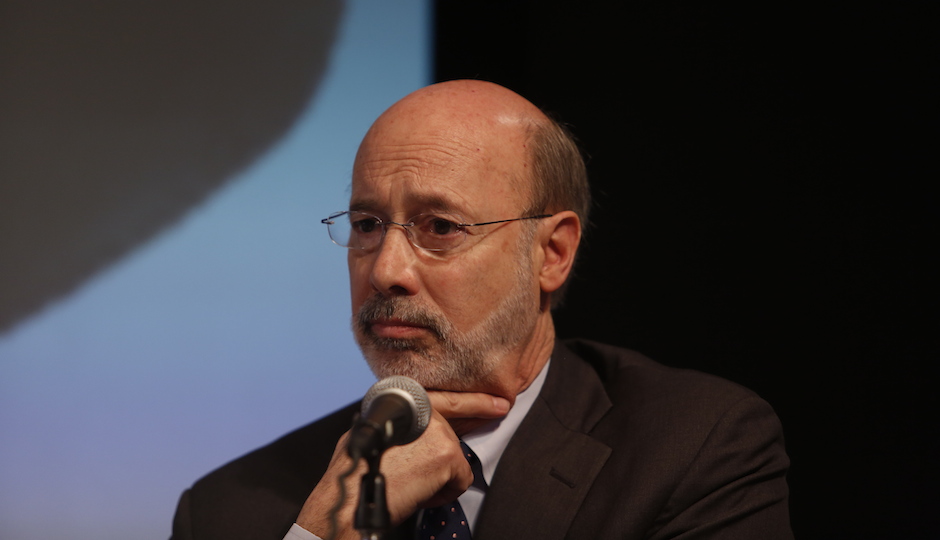Gov. Wolf to Obama: Help Prevent Oil Train Accidents
Every week, as many as 70 trains carrying crude oil from North Dakota’s Bakken formation pass through Pennsylvania, Gov. Tom Wolf says. Many are en route to Philadelphia.
Wolf wrote a letter to President Barack Obama Friday, asking him for help preventing a tragic accident involving the trains. Here’s the letter:
Dear Mr. President,
As you know, Pennsylvania is blessed with abundant natural resources, including shale gas. I am eager to attract good paying jobs to our state as we responsibly develop the gas. Expanding our manufacturing base and building new advanced manufacturing enterprises is a key goal as we cleanly use our shale gas for energy and for feedstock purposes.
The transport of some shale energy resources, and particularly Bakkan shale oil, however, raises particularly significant safety concerns. Addressing those concerns is the subject of this letter.
I am writing to express concern and respectfully ask for your help to improve the transportation of crude oil in Pennsylvania. Each week, roughly sixty to seventy trains carrying crude oil from North Dakota’s Bakken region travel through the Commonwealth destined for Philadelphia or another East Coast refinery. Pennsylvania sees some of the largest volume of Bakken crude oil transportation by rail in the United States.
Unfortunately, there already is a long history of incidents involving trains and tank cars carrying the especially volatile Bakken crude oil. Among the tragic accidents-to-date is the derailment that occurred in Lac-Mégantic, Quebec, when a train derailed and exploded, killing forty-seven people and destroying most of the town. There have also been train derailments and explosions in the United States, including recent disasters in Virginia and West Virginia, where both fires were managed by allowing them to burn out over several days. In the case of Pennsylvania, there have been four train derailments since January, 2014, including 2 within the city of Philadelphia.
Furthermore, the United States Department of Transportation just released an analysis regarding transportation of crude oil and ethanol across the nation. This analysis indicates that, under current conditions, over the next two decades these trains may derail some ten times per year and potentially fifteen times in 2015. It also indicates that an accident in a high-population area could kill more than two-hundred people and cause some six-billion dollars in damages.
The potential for disaster is too great to ignore. In my first weeks in office, I have made it a top priority to address this issue. My administration has begun to take steps to increase safety and response capability regarding trains traveling through Pennsylvania. These steps include:
- In our first full week in office we conducted an emergency table-top planning exercise to model the state’s response in the event of a crude oil train derailment in an urban area. I participated personally in this multi-hour exercise.
- I have met with executives from Norfolk Southern and have a meeting scheduled with CSX Corporation, the two top transporters of crude oil in Pennsylvania, to discuss safety measures that could lower the risk of derailments.
- I have directed the Pennsylvania Office of the Fire Commissioner to examine how an oil train fire could be extinguished if needed to protect public safety.
- We have undertaken a review of the frequency and the procedures associated with rail infrastructure inspections by federal and state inspectors.
I will continue to take these and other steps to ensure the safety of Pennsylvania’s citizens. But, the tools and options available to me are limited. I am therefore respectfully asking for your assistance in this vital matter. Expedited federal regulatory action in several areas is essential in better ensuring safety.
First, consistent national standards to reduce the volatility of crude oil prior to transportation are a must. North Dakota currently is taking steps in this regard. But we have to ensure all Bakken crude has been treated to remove dangerous volatiles and is transported under the appropriate pressure and other relevant conditions
Second, current federal standards have reduced speeds to forty miles-per-hour in high-density urban areas. It is instructive to note that recent derailments and explosions have occurred at speeds less than this limit. I therefore respectfully request further review of this matter and revisions to the speed limit as necessary to ensure against explosive derailments.
Third, inspections by government inspectors of rail infrastructure must be enhanced. In Pennsylvania we have only six inspectors trained with the support of federal resources, even though we have some five thousand miles of track, among the highest in the nation. I request additional federal assistance to assist us in hiring and training an adequate number of rail safety inspectors.
Fourth, the current standards for tank cars and braking systems are not sufficient. Recent accidents in West Virginia and Ontario both led to large oil fires, even though the tank cars were of new and more stringent design. Braking systems and tank car standards must be enhanced to reduce risk.
Finally, the pace of federal rulemaking on rail safety is too slow. We urge that new federal safety rules be developed and implemented with a sense of urgency appropriate to the risk presented.
Now is the time for action in order to increase safety and reduce risk.
Thank you Mr. President for your personal attention to this critical matter.
Respectfully and sincerely yours,
Tom Wolf
Also this week, Sen. Bob Casey urged regulators to speed up their review of a rule that would require tougher rail cars for oil transport.



